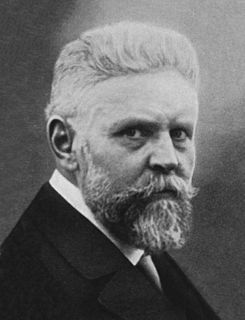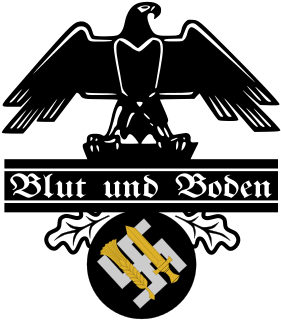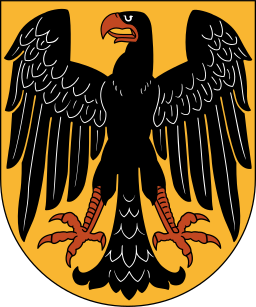See also
| Look up reinrassig in Wiktionary, the free dictionary. |
Reinrassig is a German zoological term meaning "of pure breed". [1] In Nazi Germany, the term was applied to human races.
By the racial policy of Nazi Germany, persons who could not trace Aryan ancestry back at least four generations could be considered nicht reinrassig or impure. Depending on one's ethnicity, this status could be anything from a very minor inconvenience to life-threatening.
| Look up reinrassig in Wiktionary, the free dictionary. |

The Geheime Staatspolizei, abbreviated Gestapo, was the official secret police of Nazi Germany and German-occupied Europe.

The National Socialist German Workers' Party, commonly referred to in English as the Nazi Party, was a far-right political party in Germany that was active between 1920 and 1945, that created and supported the ideology of National Socialism. Its precursor, the German Workers' Party, existed from 1919 to 1920.
Reich is a German word analogous in meaning to the English word "realm". The terms Kaiserreich and Königreich are used in German to refer to empires and kingdoms respectively. The Cambridge Advanced Learner's Dictionary indicates that in English usage, the term "the Reich" refers to "Germany during the period of Nazi control from 1933 to 1945".

The Weimar Republic is an unofficial historical designation for the German state from 1918 to 1933. The name derives from the city of Weimar, where its constitutional assembly first took place. The official name of the republic remained Deutsches Reich unchanged from 1871, because of the German tradition of substates. Although commonly translated as "German Empire", the word Reich here better translates as "realm", in that the term does not necessarily have monarchical connotations in itself. The Reich was changed from a constitutional monarchy into a republic. In English, the country was usually known simply as Germany.

Denazification was an Allied initiative to rid German and Austrian society, culture, press, economy, judiciary, and politics of the National Socialist ideology (Nazism). It was carried out by removing those who had been Nazi Party or SS members from positions of power and influence and by disbanding or rendering impotent the organisations associated with Nazism. The programme of denazification was launched after the end of the Second World War and was solidified by the Potsdam Agreement in August 1945.

A Judenrat was a World War II administrative agency imposed by Nazi Germany on Jewish communities across occupied Europe, principally within the ghettos, including those of German-occupied Poland. The Germans required Jews to form a Judenrat in every community across the occupied territories.
Führer is a German word meaning "leader" or "guide". As a political title it is associated with the Nazi dictator Adolf Hitler.

Deutsches Reich was the constitutional name in the German language for the German nation state that existed from 1871 to 1945. The Reich became understood as deriving its authority and sovereignty entirely from a continuing unitary German "national people"; with that authority and sovereignty being exercised at any one time over a unitary German "state territory" with variable boundaries and extent. Although commonly translated as "German Empire", the word Reich here better translates as "realm" or territorial "reach," in that the term does not in itself have monarchical connotations. The word Kaiserreich is applied to denote an empire with an emperor; hence the German Empire of 1871–1918 is termed Deutsches Kaiserreich in standard works of reference. From 1943 to 1945, the official name of Germany became – but was not formally proclaimed – Großdeutsches Reich on account of the additional German peoples and associated territories annexed into the state's administration before and during the Second World War.
The Völkisch movement was a German ethnic and nationalist movement from the late 19th century up until the Nazi era. Erected on the idea of "blood and soil", inspired by the one-body-metaphor (Volkskörper) and the idea of naturally grown communities in unity, it was characterised by organicism, racialism, populism, agrarianism, romantic nationalism and, as a consequence of a growing exclusive and ethnic connotation, by antisemitism from the 1900s onwards.

The term racial hygiene was used to describe an approach to eugenics in the early 20th century, which found its most extensive implementation in Nazi Germany. It was marked by efforts to avoid miscegenation, analogous to an animal breeder seeking purebred animals. This was often motivated by the belief in the existence of a racial hierarchy and the related fear that lower races would "contaminate" a higher one. As with most eugenicists at the time, racial hygienists believed that the lack of eugenics would lead to rapid social degeneration, the decline of civilization by the spread of inferior characteristics.
This is a list of words, terms, concepts and slogans of Nazi Germany used in the historiography covering the Nazi regime. Some words were coined by Adolf Hitler and other Nazi Party members. Other words and concepts were borrowed and appropriated, and other terms were already in use during the Weimar Republic. Finally, some are taken from Germany's cultural tradition.

Blood and soil is a nationalist slogan expressing Nazi Germany's ideal of a "racially" defined national body ("blood") united with a settlement area ("soil"). By it, rural and farm life forms are not only idealized as a counterweight to urban ones, but they are also associated with an imaginary and sedentary Germanic-Nordic peasantry which is placed in opposition to an anti-Semitic trope of Jewish nomadism. It is tied to the contemporaneous German concept of Lebensraum, the belief that the German people were to expand into Eastern Europe, conquering and displacing the native Slavic and Baltic population via Generalplan Ost. "Blood and soil" was a key slogan of National Socialist (Nazi) ideology. The nationalist ideology of the Artaman League and the writings of Richard Walther Darré guided agricultural policies which were later adopted by Adolf Hitler, Heinrich Himmler and Baldur von Schirach.
The Jewish question (JQ), also referred to as the Jewish problem, was a wide-ranging debate in 19th and 20th-century European society that pertained to the appropriate status and treatment of Jews. The debate, which was similar to other "national questions", dealt with the civil, legal, national and political status of Jews as a minority within society, particularly in Europe during the 18th, 19th and 20th centuries.
Collaborationism is cooperation with the enemy against one's country of citizenship in wartime. The term is most often used to describe the cooperation of civilians with the occupying Axis Powers, especially Nazi Germany and Imperial Japan, during World War II. Motivations for collaboration by citizens and organizations included nationalism, ethnic hatred, anti-communism, antisemitism, opportunism, self-defense, or often a combination of these factors. Some collaborators in World War II committed war crimes, crimes against humanity, or atrocities such as the Holocaust. More often collaborators simply "went along to get along," attempting to benefit from the occupation or simply survive. The definition of collaborationism is imprecise and subject to interpretation.

Gau Bayreuth was an administrative division of Nazi Germany in Lower Bavaria, Upper Palatinate and Upper Franconia, Bavaria, from 1933 to 1945. From 1926 to 1933, it was the regional subdivision of the Nazi Party for these areas.

The Reichstag was the Lower house of the Weimar Republic's Legislature. It originated in the creation of the Weimar Constitution in 1919. After the end of the Weimar Republic in 1933, the Reichstag continued to operate, albeit sporadically, as a purely nominal legislature of Nazi Germany.
National Socialism, more commonly known as Nazism, is the ideology and practices associated with the Nazi Party—officially the National Socialist German Workers' Party —in Nazi Germany, and of other far-right groups with similar ideas and aims.

The Reichstag, officially the Großdeutscher Reichstag after 1938, was the pseudo-Parliament of the Third Reich from 1933 to 1945. Following the Nazi seizure of power and the passing of the Enabling Act of 1933, it met only as a rubber stamp for the actions of Adolf Hitler's dictatorship — always by unanimous consent — and to listen to Hitler's speeches. In this purely ceremonial role, the Reichstag convened only 20 times, the last on 26 April 1942. The President of the Reichstag throughout this period was Hermann Göring.
The German term Mitläufer German for "fellow traveller", refers to a public person or persons who are believed to be tied to, or are passive sympathisers of certain social movements, often to prevalent controversial or radical ones. In English, it was most commonly used after World War II, during the denazification hearings in West Germany, to refer to people who were not charged with Nazi crimes but whose involvement with the Nazi Party was considered significant to an extent that they could not be exonerated for the crimes of the Nazi regime.
Proletarian nation was a term used by 20th century Italian nationalist intellectuals such as Enrico Corradini and later adopted by Italian Fascist leader Benito Mussolini to refer to Italy and other poorer countries that were subordinate to the Western imperialist powers. These powers were described by Mussolini as "plutocratic nations". Corradini associated the proletariat with the economic function of production and believed that the producers should be at the forefront of a new imperialist proletarian nation. Mussolini considered that the military struggles unfolding in Europe in the mid-20th century could have revolutionary consequences that could lead to an improvement in the position of Italy in comparison with the major imperialist powers such as Britain.
| This article related to The Holocaust is a stub. You can help Wikipedia by expanding it. |
| This article related to Nazi Germany is a stub. You can help Wikipedia by expanding it. |